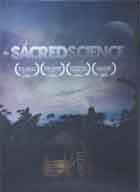
The Sacred Science 2011
Distributed by The Video Project, PO Box 411376, San Francisco, CA 94141-1376; 800-475-2638
Produced by Nick Polizzi & Dan Bailey
Directed by Nick Polizzi
DVD , color, 77 min.
General Adult
Health Sciences
Date Entered: 03/22/2013
Reviewed by Jessica Schomberg, Minnesota State University, Mankato“Witness the story of eight brave souls as they leave the developed world behind in search of deeper answers” about medicine and healing.As someone who’s lived with chronic illness since childhood, I was very curious about what direction this documentary would take. Would it discuss Big Pharma and (global) income disparities in treatment options? Or the environmental and/or social impacts of using the Amazonian rain forest as a global pharmaceutical warehouse? Or would it explore the reasons people have for abandoning conventional medicine for alternative remedies? Or maybe it would discuss the psychological aspects of living with chronic illness and perhaps the need for more open discussions of end of life options, especially for people facing terminal illnesses?
Unfortunately, by the time the indigenous* medicine men were talking about providing the psychotropic Ayuhuasca for everyone with the observation that it’s universally effective and can do no harm (false) and showing the “creeper vine of love” that helps men get women, I was starting to yell at my television.
Yes, most of the people who participated in this film said that they felt better after their treatment. However, they spent their time outdoors, eating fresh foods, getting regular exercise and having no other goal besides focusing on their health. Given that there was no long-term follow-up, I am skeptical of the benefits presented.
Overall, much of the time it felt less like watching a documentary than like watching a reality TV-inspired infomercial for medical tourism. There’s a market for this sort of thing, and the glossy production quality and magical thinking will appeal to some, but I can’t recommend the film based on content.
*I’m guessing the indigenous people were Quechua, but if it was stated anywhere in the film it was not readily apparent.